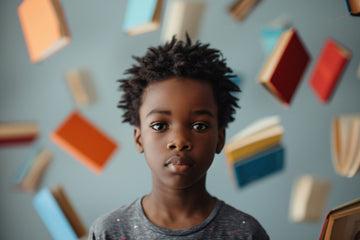For many Black British children, story time wasn't always a place of reflection. The bookshelves were often populated by characters who didn't look like them, adventures set in faraway lands, with experiences far removed from their own. But thankfully, the landscape of Black children's literature in the UK is undergoing a beautiful transformation.

Early Days: Absence and Stereotypes
Traditionally, Black children were largely absent from children's books, or relegated to stereotypical roles.The offensive Golliwog caricatures were prevalent for a disturbingly long time. Thankfully, activism and a growing awareness of racism led to a decline in these depictions.
The Pioneering Voices: Filling the Gap

The 1960s and 70s saw the rise of independent Caribbean and Black British publishers like Bogle-L'Ouverture and New Beacon Books. These houses championed stories that celebrated Black identity and history. Writers like John Agard and James Berry crafted tales that empowered young readers and reflected their experiences.
A Growing Movement: From Tokenism to Rich Diversity
The fight for representation continued. The 80s and 90s witnessed the emergence of groundbreaking authors like Jackie Kay and Leon Chambers. But Black characters were often still seen as tokens in predominantly white narratives.
The Present: A Celebration of Black Brilliance
Today, Black children's literature in the UK is thriving! We have a wealth of talented authors like Malorie Blackman, Patrice Lawrence, and Benjamin Zephaniah. Their stories encompass a multitude of genres, from fantasy and adventure to historical fiction and contemporary issues. Black joy, resilience, and cultural heritage are proudly showcased.
The Road Ahead: Continuing Progress
While there's been incredible progress, the work isn't done. We need to ensure Black authors are well-represented across all major publishers and that diversity extends beyond the page, with more Black illustrators and editors shaping the industry.
The Importance of Representation
Black children's literature is more than just entertainment. It's a mirror reflecting their reality, a window into the wider world, and a wellspring of confidence. Seeing heroes and heroines who look like them, navigating relatable experiences, is vital for young Black readers. It allows them to say, "Yes, that's me in that story. I can achieve great things too."
So, the next time you pick up a children's book, look for the stories brimming with Black brilliance. Let's keep this literary revolution flourishing, ensuring every child finds themselves reflected on the page.

